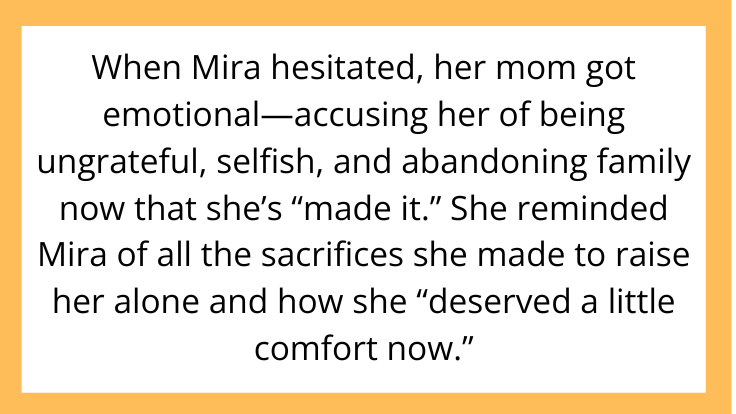AITAH for Not Letting My Mom Move Into My Apartment After I Got a Promotion?
When big life changes happen—like getting a promotion or moving into a new place—family expectations often follow closely behind. But what happens when your success becomes someone else’s opportunity to impose?
In today’s AITAH scenario, we dive into a story of independence, guilt, and an unexpected family demand that’s divided readers online.
The Background: A Promotion, a New Apartment, and Unwanted Pressure

The poster (let’s call her Mira), a 26-year-old woman, recently received a long-awaited promotion at her job. With the bump in salary, she finally fulfilled a personal goal: moving into a spacious one-bedroom apartment in the city.
After years of living in shared spaces and tiny rentals, Mira was excited to create a home that was entirely her own. She decorated, furnished it just the way she liked, and was looking forward to enjoying her space in peace.
Then, her mother called.
The Request: “You Have Space Now—Let Me Move In”

Mira’s mother, who had been living with Mira’s aunt in the suburbs after going through a divorce, suddenly suggested she move in with Mira.
“You’re doing well now,” she said. “You have a whole apartment to yourself. Why should I stay with your aunt when you have room?”
At first, Mira thought it was a joke. But her mom was completely serious.
When Mira hesitated, her mom got emotional—accusing her of being ungrateful, selfish, and abandoning family now that she’s “made it.” She reminded Mira of all the sacrifices she made to raise her alone and how she “deserved a little comfort now.”
Mira Says No—And the Fallout Begins

Mira stood her ground. She explained that she loved her mother but needed her own space. After years of struggling financially, she finally had control over her environment and didn’t want to give that up—not even for family.
She even offered to help her mom with rent somewhere nearby or contribute toward her staying with a roommate. But sharing a one-bedroom apartment wasn’t something she was willing to do.
Her mother was hurt—and made sure Mira knew it. She told extended family members, who began messaging Mira with guilt-laced comments like:
-
“You wouldn’t even have this job if it weren’t for your mother’s sacrifices.”
-
“Family comes first.”
-
“What kind of daughter leaves her mother behind?”
Mira posted on Reddit, genuinely unsure if she was the bad guy in the situation.
Reddit Reacts: Is She the Villain or Setting Healthy Boundaries?

The r/AITAH community, known for its balanced (and often blunt) takes, mostly came to Mira’s defense.
Why Most People Said “Not the Villain”
-
Boundaries Matter: Mira is an adult with the right to personal space, especially in her own home.
-
Support Doesn’t Equal Sacrifice: Offering help with rent or alternate living options is generous. Mira isn’t abandoning her mother—she’s simply refusing to live together.
-
Guilt Isn’t Love: Using emotional manipulation to get what you want, even as a parent, crosses a line.
One top comment put it perfectly:
“Your mom raised you out of love, not as an investment expecting a return. You’re allowed to say no.”
Some Nuanced Views Emerged
A few commenters did empathize with the mother’s situation, especially if she was struggling financially or emotionally after divorce.
But even then, most agreed the solution shouldn’t come at the cost of Mira’s independence or mental health.
Cultural Expectations vs. Individual Boundaries

This AITAH post also opened up a wider discussion about cultural norms. In many cultures, it’s expected that children will take in their parents as they age or go through hard times.
But those expectations are changing, especially in younger generations who are increasingly prioritizing mental well-being and healthy boundaries.
Mira’s situation isn’t just about her mother wanting a place to stay—it’s about whether love means constant access, or whether it can also mean supporting from a respectful distance.
What Could Mira Do Next?

While Reddit largely supported her, situations like this rarely end at a single “no.” Here’s what Mira—and others in similar positions—might consider:
-
Have a Calm, Honest Conversation: Reaffirm love and appreciation, but restate boundaries clearly.
-
Offer Help in Other Ways: Contributing financially, helping find housing, or visiting regularly can show care without sacrificing peace.
-
Get Support: Involving a therapist or neutral third party can help both sides feel heard.
Ultimately, Mira isn’t saying “I don’t care”—she’s saying, “I care, but I also care about myself.”
Final Thoughts: You’re Not a Villain for Choosing Yourself

This AITAH story reminds us of a crucial truth: Self-care isn’t selfish. Saying “no” to someone you love is never easy—but it’s sometimes necessary.
Mira isn’t heartless. She’s someone who worked hard, achieved something meaningful, and is now protecting that progress. Her refusal isn’t a betrayal—it’s a boundary.
And boundaries, especially with family, are a sign of growth—not guilt.



